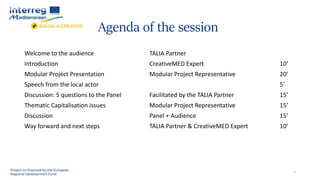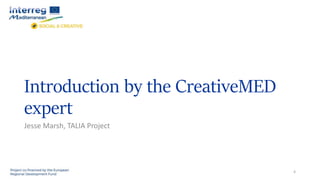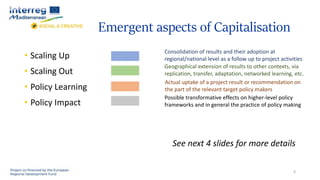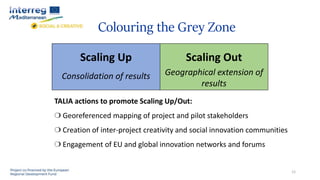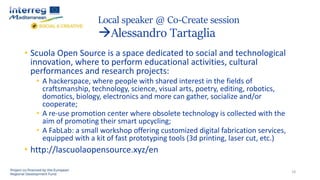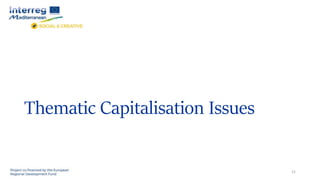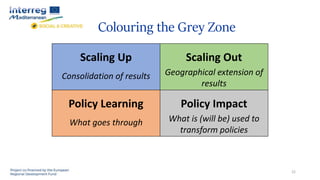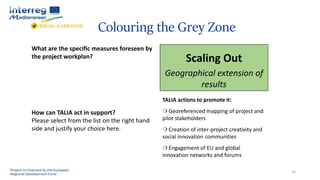Co-Create Project
- 1. TALIA Parallel session with the Co-Create Project Bari, 15 March 2017
- 2. Overview of the Speakers Session title: Co-Create Name & Surname Affiliation Modular project representative Roberto Sandrini, lead partner Chamber of Commerce of Rovigo Panelist #1 Mikel Oleaga, TALIA associated partner Impact Hub, Basque Country Panelist #2 Kostantinos Christofakis, modular project partner Development Agency of South Aegean Region (READ), Greece Panelist #3 Alessandro Tartaglia, local speaker Scuola Open Source Session chair Zsuzsanna Bodi, TALIA partner ENoLL, Brussels Jesse Marsh CreativeMED expert 2
- 3. Agenda of the session Welcome to the audience TALIA Partner Introduction CreativeMED Expert 10’ Modular Project Presentation Modular Project Representative 20’ Speech from the local actor 5’ Discussion: 5 questions to the Panel Facilitated by the TALIA Partner 15’ Thematic Capitalisation issues Modular Project Representative 15’ Discussion Panel + Audience 15’ Way forward and next steps TALIA Partner & CreativeMED Expert 10’ 3
- 4. Introduction by the CreativeMED expert Jesse Marsh, TALIA Project 4
- 5. A Project’s Fallout Effects/Impacts Capitalisation Deliverables Activities • Thematic domain • Policy level • Private stakeholders • Public stakeholders • MA(s) • J(T)S • End users • Partners/Pilots 5
- 6. Emergent aspects of Capitalisation • Scaling Up • Scaling Out • Policy Learning • Policy Impact See next 4 slides for more details 6 Consolidation of results and their adoption at regional/national level as a follow up to project activities Geographical extension of results to other contexts, via replication, transfer, adaptation, networked learning, etc. Actual uptake of a project result or recommendation on the part of the relevant target policy makers Possible transformative effects on higher-level policy frameworks and in general the practice of policy making
- 7. Scaling Up • Good project results, but then little happens – why? • In search of an explanation, one first has to look introspectively to the project itself • Questions: • Were you thinking about sustainability from day 1 or only as an afterthought? • Were the results actually foreseen or simply discovered? • What was the degree of perfection / refinement of proposed solutions? • Were results really relevant to the MED space? • Were sustainability measures adequate? • Answers possibly affected by the vertical domain of interest – but we suspect only to a limited extent 7
- 8. Scaling Out • If the project worked fine in X regions, why couldn’t it be the same in the remaining (43-X, or even 271-X) ones? • Geographical extension is only one example of transfer, which may also involve complex processes such as • Imitation • Emulation • Incubation • Competition • However we register that there are currently no ways to scale good project results out to an extent that avoids reinventing the wheel or facilitates standing on the precursors’ shoulders 8
- 9. Policy Learning • To the extent the project implications remain untapped, policy makers are missing a great potential in terms of discovery of insights on • Common/replicable practices • Key actors / tools / enablers • Market exploitable innovations • Usable guidelines for policy change • A gap analysis is probably required to highlight the learning trajectories from project results to evidence based policy actions • Are these transmission mechanisms domain specific or can they be made uniform / standardised? 9
- 10. Policy Impact • Transforming regional policies is a key goal of territorial cooperation: making this happen depends on • The presence of a fertile policy environment • A strong investment in learning capacity of decision makers • The new programme’s strategy is already acting in this direction, however impact is mainly assessed ex post • A process-oriented in itinere approach would help • An interim step forward might be the creation of a community of convergent actors and interests • With a clear definition of goals for policy transformation • Activating processes of formative evaluation 10
- 11. Colouring the Grey Zone Scaling Up Consolidation of results Scaling Out Geographical extension of results Policy Learning What goes through Policy Impact What is (will be) used to transform policies 11
- 12. Colouring the Grey Zone Scaling Up Consolidation of results Scaling Out Geographical extension of results 12 TALIA actions to promote Scaling Up/Out: ❍ Georeferenced mapping of project and pilot stakeholders ❍ Creation of inter-project creativity and social innovation communities ❍ Engagement of EU and global innovation networks and forums
- 13. Colouring the Grey Zone Policy Learning What goes through Policy Impact What is (will be) used to transform policies 13 TALIA actions to promote Policy Learning/Impact: ❍ Framing modular project concepts into a ‘Mediterranean model’ of creativity and social innovation ❍ Aggregation and mapping of modular project results to generate policy evidence ❍ Promotion of triple loop learning in regional / national / EU policy makers
- 14. A Triple Loop Learning Exercise 14 POLICIES MED PROGRAMME C&SI PROJECTS RESULTS COMMUNITY MAPPINGCOMMON MODELPOLICY TOOLKIT
- 16. Presentation by the Modular Project Leader 16
- 17. Presentation by the Local Actor 17
- 18. Local speaker @ Co-Create session Alessandro Tartaglia 18 • Scuola Open Source is a space dedicated to social and technological innovation, where to perform educational activities, cultural performances and research projects: • A hackerspace, where people with shared interest in the fields of craftsmanship, technology, science, visual arts, poetry, editing, robotics, domotics, biology, electronics and more can gather, socialize and/or cooperate; • A re-use promotion center where obsolete technology is collected with the aim of promoting their smart upcycling; • A FabLab: a small workshop offering customized digital fabrication services, equipped with a kit of fast prototyping tools (3d printing, laser cut, etc.) • http://lascuolaopensource.xyz/en
- 19. Discussion 19
- 20. Questions Session Questions for the Panel (feel free to change) 1) What is the most widely acknowledged definition of Cultural and Creative Industries and how does it fit into the Project objectives and expected results? ❏ Co-create 2) What is the closest working example you are familiar with to the concept of transnational (or transregional) network of clusters? 3) How do you think the figure / role of Cluster Manager aligns with the scope and purposes of this Project? 4) Can you name at least one project or initiative at national / European level that is coherent with the philosophy and principles of this Project? 5) What are the networks or communities or individual actors that come to your mind when thinking about the clustering and dissemination potential of this Project? 20
- 22. Colouring the Grey Zone Scaling Up Consolidation of results Scaling Out Geographical extension of results Policy Learning What goes through Policy Impact What is (will be) used to transform policies 22
- 23. Colouring the Grey Zone Scaling Up Consolidation of results 23 What are the specific measures foreseen by the project workplan? How can TALIA act in support? Please select from the list on the left hand side and justify your choice here. TALIA actions to promote it: ❍ Georeferenced mapping of project and pilot stakeholders ❍ Creation of inter-project creativity and social innovation communities ❍ Engagement of EU and global innovation networks and forums
- 24. Colouring the Grey Zone Scaling Out Geographical extension of results 24 What are the specific measures foreseen by the project workplan? How can TALIA act in support? Please select from the list on the right hand side and justify your choice here. TALIA actions to promote it: ❍ Georeferenced mapping of project and pilot stakeholders ❍ Creation of inter-project creativity and social innovation communities ❍ Engagement of EU and global innovation networks and forums
- 25. Colouring the Grey Zone Policy Learning What goes through 25 What are the specific measures foreseen by the project workplan? How can TALIA act in support? Please select from the list on the left hand side and justify your choice here. TALIA actions to promote it: ❍ Framing modular project concepts into a ‘Mediterranean model’ of CSI ❍ Aggregation and mapping of modular project results to generate evidence ❍ Promotion of triple loop learning
- 26. Colouring the Grey Zone Policy Impact What is (will be) used to transform policies 26 What are the specific measures foreseen by the project workplan? How can TALIA act in support? Please select from the list on the right hand side and justify your choice here. TALIA actions to promote it: ❍ Framing modular project concepts into a ‘Mediterranean model’ of CSI ❍ Aggregation and mapping of modular project results to generate evidence ❍ Promotion of triple loop learning
- 27. Discussion 27
- 28. Way forward and next steps 28
- 29. 29 29


